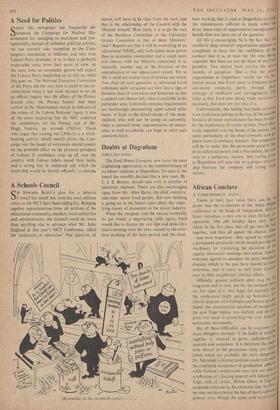Doubts at Dagenham
JOHN COLE Writes:
The Ford Motor Company now faces the most frightening opportunity in the troubled history of its labour relations at Dagenham. To seize it, the board has sensibly decided that a new man, Mr. L. J. E. Beeson, should take over as director of industrial relations. There are also encouraging signs, from Mr. Allen Barke, the chief executive, and other senior Ford people, that new thinking is going on in the board room about the under- lying causes of discontent in the motor industry.
When the company and the unions eventually do get round a negotiating table again, Ford would like--to discuss the vast dips and peaks in, a man's earnings over the year, caused by the over- time working of the busy period and the short- time working that is used at Dagenham to avoid the redundancies suffered in many other car firms. Some kind of supplemental unemployment benefit does not seem out of the question.
All this is encouraging. So is the fact that the unofficial shop stewards' organisation appears SU completely to have lost the confidence of the workers that it is, at least for the time being, impotent. But these are not the heart of the Ford problem. wo dismal facts survive the seven months of purgation. One is that the union organisation at Dagenham—partly for the his- torical reason that Ford came to England as an anti-union company, partly through sheer lethargy—is, inefficient and unimaginative. he other is that Ford now thinks trade unionism Is necessary, but does not feel that it is.
Unfortunately, this feeling that trade unionism an irrelevance getting in the way of the sensible business of motor manufacture has been fortified by the experiences of recent months. Ford elle' Lively appealed over the heads of the unions. and more particularly of the shop stewards, and get peace from its ordinary workers. The temptation will be to make this the permanent pattern. BLit in an industrial society and a free society, this can only be a temporary success. Any lasting floc' at Dagenham will only rest on a proper relation' ship between the company and strong trade unions.


































 Previous page
Previous page